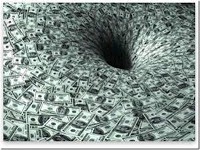
Each year the United States government files a financial statement showing their assets and liabilities through the Department of the Treasury. And while previous years have been similar to 2015, in that their liabilities outweigh assets by a large margin, never before has the deficit been as extraordinary as it was calculated on Feb. 27.
This because the United States (which is a corporation by the way), has assets valued at $3.2 trillion while showing short-term liabilities at over $21.5 trillion. This is a difference of $18.3 trillion in the red, and in every single instance of financial definition would make the country (or corporation) insolvent and bankrupt.
The US government just published its audited financial statements this morning, signed and sealed by Treasury Secretary Jack Lew.
These reports are intended provide an accurate accounting of government finances, just like any big corporation would do.
And once again, the US government’s financial condition has declined significantly from the previous year.
For 2015, the government reports $3.2 trillion in total assets.
This includes everything from financial assets like bank balances to physical assets like tanks, bullets, aircraft carriers, and the federal highway system.
On the other side of the equation are a reported $21.5 trillion in liabilities, giving the government an official net worth of negative $18.2 trillion.
This is down from last year’s negative $17.7 trillion and $16.9 trillion the year prior. It just keeps getting worse. - Sovereign Man
Yet what makes this even more astounding is that the U.S. Treasury Department is claiming the $1.2 trillion they hold in student loans as part of their assets, of which 17%, or 7 million Americans, are in default or severely delinquent.
(Kind of similar to how banks claimed insolvent mortgage backed securities as assets during the 2008 Crisis)
The U.S. is not alone in the global economy in having more liabilities than assets, but as they remain able to manufacture debt at will as keepers of the world’s reserve currency, they are in a better position to force other nations to still accept the dollar and play along with this confidence game. But even this power is teetering on the edge of a knife because once critical mass is reached in the world having an alternative currency to use in international trade, then it will inevitably bring down this bankrupt house of cards for the entire U.S. system.
Kenneth Schortgen Jr is a writer for Secretsofthefed.com, Examiner.com, Roguemoney.net, and To the Death Media, and hosts the popular web blog, The Daily Economist. Ken can also be heard Wednesday afternoons giving an weekly economic report on the Angel Clark radio show.

